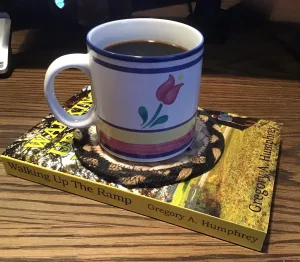I have three or four books going at any given time, and today I read another chapter in the just amazing New York Times bestseller Churchill: Walking With Destiny by Andrew Roberts. Chapter 13 concludes with the miner’s strike in Britain in 1926. (Page 323 and we are still in 1926! This is a thorough account of Winston, and as a biography, it is stunning in scope.) Also, once again, are the inclusions about his personal life which allows for a most remarkable multi-dimensional character to form.
For all the history books I have enjoyed over the decades this is my first Churchill read, and it is crafted so that there is no way to have only one, or two, or three views of this world leader. Each chapter leaves me with a new side of the man to contemplate.
In 1923 Churchill will write to his wife, Clementine, “a dissertation on dining room chairs” which stated that “the dining room chair has certain very marked requisites. It needs to be comfortable have arms and be compact, and in the back had to be almost perpendicularly over the legs. There also needed to be no fewer than 20 of them. Meals around the circular table in Chartwell’s (one of his residences) dining room would last “two or sometimes three hours as repartee and argument flash to and fro or long remembered lines of verse and prose poured forth in torrents.”
Large numbers of animals lived at Chartwell, too, over the years. There were two faithful red-orange poodles, black swans from Australia, a Canadian goose called the “Flag Lieutenant” because he reminded Churchhill of a naval officer. The Churchills started keeping bees so the family could have their own honey for tea. Clementine, having been a member of the Kent beekeepers association for several years. Twenty years later Churchill ordained that the Chartwell strawberries when sold locally, all be packed with their noses facing down to emphasize the freshness.
On the common land above the Chartwell estate lived Mr. and Mrs. ‘Donkey” Jack, a Ronany couple. Churchhill paid for Jack’s funeral in 1933 saving him from a pauper’s grave and when his widow was evicted by the local council he offered to get a place in a home for her at his own expense. She nonetheless preferred to camp in a shack in the woods for the rest of her life which he allowed. These personal acts of generosity were not known about outside the family at the time, but they came naturally to Churchhill.
During the miner’s strike, a most remarkable story unfolds. It involves Churchhill on May 9 of 1926 wanting to commandeer the BBC which was unnecessary as it already supported the government. In so doing he made an enemy for life of Sir John Reith, it’s general director and subsequently kept him off the airwaves for much of the 1930s and expressed his loathing of him in his diaries even when Churchill was serving in his wartime government.
An amazing story! An amazing book!


